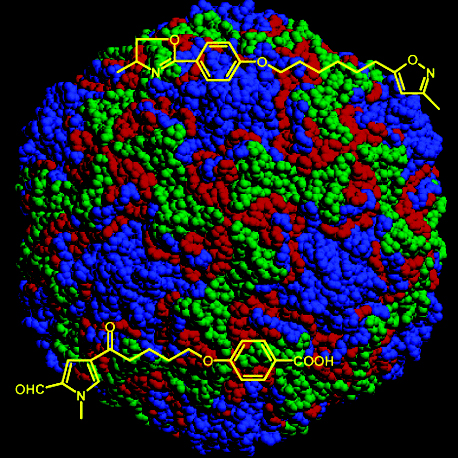Saturation Transfer Differences (STD) NMR for Coronavirus Research
Saturation transfer differences (STD) NMR is not only a method for drug discovery and screening, but also has qualitative and quantitative applications that can answer questions involving molecular interactions between ligands and proteins, in particular to obtain dissociation constants from STD NMR titrations. The STD NMR experiment has proved to be a powerful tool for studying ligand binding to native viruses or virus-like particles (VLPs). Creative Biostructure provides the STD NMR service to characterize the binding epitopes of ligands and their target proteins or VLPs involved in coronavirus research.
Brief Introduction to Saturation Transfer Differences (STD) NMR

STD NMR is a simple and rapid method for screening ligands and identifying ligand-protein binding characteristics. This method does not require stable isotope or radioisotope labeling and is extremely sensitive to detect ligand binding at low protein concentration similar as that in cells, thus requiring only a small number of samples. The values including KD, association and dissociation kinetics can be obtained from the STD NMR experiment.
Previous studies reported the identification and characterization of ligand binding to viruses by this technology. The researchers utilized STD NMR to monitor the specific interaction of antiviral compounds (such as capsid-binding inhibitors) with native human rhinovirus type 2 (HRV-2). The STD NMR experiment at atomic resolution allows the identification of ligand regions involved in the interaction with the virus. This technique enables 1) rapid and robust evaluation of binding force; 2) determination of ligand binding epitopes at atomic resolution without the need to crystallize virus-ligand complexes; 3) identification of small-molecules, peptides, and antibody fragments to the viral capsid.
Our STD NMR Services for Coronavirus Research
Novel coronavirus (also known as SARS-CoV-2, formerly named 2019-nCoV) caused the Coronavirus Disease 2019 (COVID-19) Pneumonia is the first coronavirus pandemic in human. It has led to huge economic losses due to its extremely infectious and difficulty in controlling. There is an urgent need to study the infection process and develop vaccines or drugs that can reduce the burden of this disease based on these basic researches. Scientists in the field of biomedicine all over the world are working hard towards this common objective.
Creative Biostructure has extensive expertise and service experience in virology and biophysics. We are confident to provide you with STD NMR service to help you solve the ligand screening and identification/characterization of ligand-protein/ligand-VLP during coronavirus research. Before executing the STD NMR experiment, our scientists will design the experimental strategy according to your research purpose. Our standard operation procedure ensures the reliability of the experimental data. In the end, we will deliver all the raw data and an analysis report of experimental results.
Our services for protein interaction analysis for coronavirus research also include surface plasmon resonance (SPR), bio-layer interferometry (BLI), isothermal titration calorimetry (ITC), fluorescence resonance energy transfer (FRET) and microscale thermophoresis (MST). If you are interested in our services, please feel free to contact us. Our customer service representatives are available 24 hours a day from Monday to Sunday.
Contact us to discuss your project!
References
- Benie A J.; et al. Virus-ligand interactions: identification and characterization of ligand binding by NMR spectroscopy. Journal of the American Chemical Society. 2003, 125(1): 14-15.
- Mallagaray A.; et al. Saturation transfer difference nuclear magnetic resonance titrations reveal complex multistep-binding of l-fucose to norovirus particles. Glycobiology. 2017, 27(1): 80-86.


